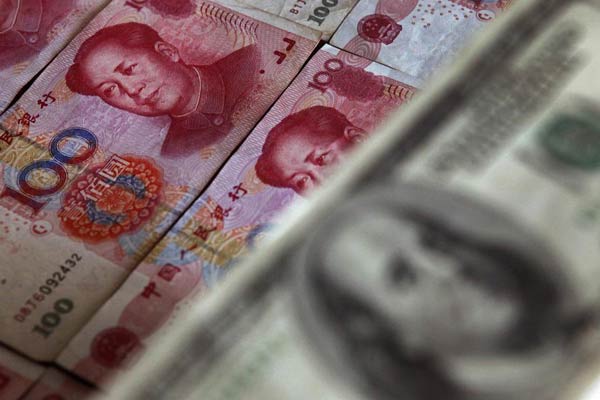China's forex reserves data may improve due to a stable yuan
Updated: 2016-08-08 10:19
(Xinhua)
|
|||||||||
 |
|
A photo illustration shows a $100 banknote placed above Chinese 100 yuan banknotes in Beijing in this May 10, 2013 file photo. [Photo/Agencies] |
BEIJING - China's foreign exchange (forex) reserves dropped slightly in July as downward pressure eased thanks to a stronger yuan, the Chinese currency, official data showed on Sunday.
Looking forward, China's forex reserves data may improve, as yuan, also known as the renminbi (RMB), is expected to stay largely stable and forex outflows to slow down, a research team said after the data was released.
Forex reserves stood at $3.201 trillion at the end of July, down from June's $3.205 trillion, according to data released Sunday by the People's Bank of China (PBOC), the central bank.
The data was basically in line with market forecasts.
The reserves have been stable as a stronger yuan meant that the PBOC did not have to resort to using foreign exchanges to prop up the currency, and capital outflow also lessened, analysts said.
The yuan strengthened against a basket of currencies last month.
Its exchange rate composite index, which measures yuan's strength relative to currencies including the US dollar, euro and Japanese yen, came in at 95.34 at the end of July, from 95.02 a month earlier, according to financial services provider China Foreign Exchange Trade System.
China's forex reserves had been on a losing streak since November 2015 due to concerns over a weak yuan and capital flight, even slipping to a almost-five-year low of $3.19 trillion in May.
But the trend quickly returned to growth as signs of stabilizing economic growth relieved market concerns. In June, there was an unexpected rise of $13.43 billion.
China International Capital Corporation (CICC) also attributed the stabilizing forex reserves to a softening US dollar (USD), which boosted the valuation of non-USD reserves.
Forex outflows from China may have continued in July, but at a slower pace, also contributing to the narrowing of forex reserve shrinking, the CICC, China's leading investment bank, said in a report.
The RMB's inclusion in the SDR basket, scheduled to come into effect in October, would not result in a sharp depreciation of the currency.
The investment bank called it a "misperception" that China will devaluate the RMB after the SDR inclusion takes effect.
As the International Monetary Fund's (IMF) third largest shareholder and a new SDR currency issuer, China needs to establish its credibility for consistent and transparent policymaking. And this is in China's own interest, the report said.
Exchange rate instability, as a source of policy uncertainty, would discourage investment and consumption, dragging China into an "uncertainty trap," CICC said.
"Against this backdrop, we expect the RMB to be largely stable and forex outflows to slow down in the second half of 2016, and the sharp declines of forex reserves are not likely to repeat any time soon," it added.
Even after two years' declining, China's reserves remain the largest in the world.
China still has abundant forex reserves that can help fend off risks from cross-border capital flows, Wang Chunying, spokesperson of the State Administration of Foreign Exchange, said in late July.
Related Stories
China's forex reserves down slightly in July 2016-08-07 13:07
China's forex reserves rise in June 2016-07-07 17:03
China's forex reserves dip in May 2016-06-07 16:41
China's forex reserves rise to $3.22 trillion 2016-05-07 13:35
Stable yuan lifts China’s forex reserves 2016-04-08 11:00
Today's Top News
Bank of England cuts rates to record low, restarts QE
Chinese tech to make Himalayan train possible
London unveils new anti-terror unit amid knife attack
Woman killed, five injured in London knife attack
Fury at Republican Party over Trump snub of Ryan
Ukraine's Savchenko on hunger strike
Chinese tourists robbed in France
5 feared dead as Russian helicopter shot down
Hot Topics
Lunar probe , China growth forecasts, Emission rules get tougher, China seen through 'colored lens', International board,
Editor's Picks

|

|

|

|

|

|







